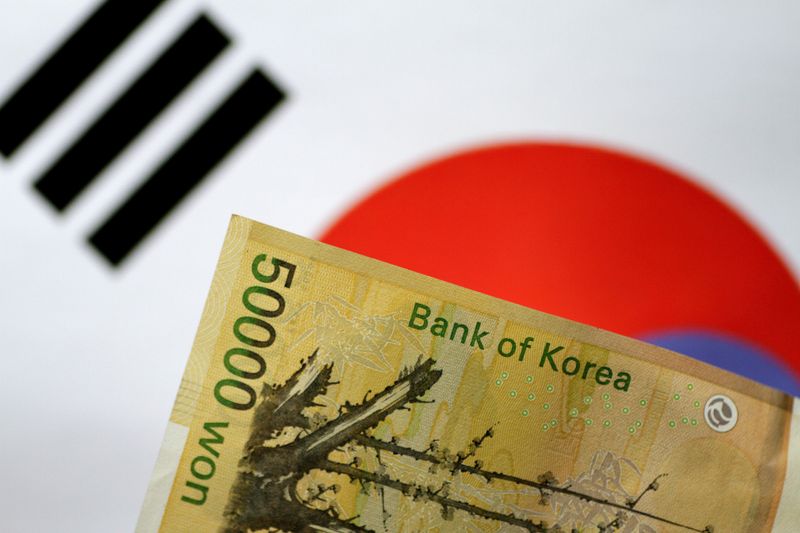By Cynthia Kim and Yena Park
SEOUL (Reuters) - As South Korea seeks to boost the global profile of its financial markets, the export powerhouse is struggling to loosen the tight currency restrictions that have for years been a major pain point for investors and traders in the country.
Asia's fourth-largest economy is one of the world's most advanced by many metrics but has been unable to shake its classification as an emerging market due to a host of issues, including the way its currency is managed.
While foreign exchange regulators are now considering modest steps to make the won more global, such as extending trading hours, memories of bruising foreign exchange crises cast a long shadow over reforms.
For many firms and market participants, South Korea's arcane restrictions on cross-border transactions, daily reporting requirements and broker rules make doing business slow and costly.
"Having FX markets open almost all day around the clock will certainly help us to better plan currency conversions, and get a better deal," said Bongju Kang, chief financial manager at a small plastic materials exporter. "Currently we negotiate the exchange rate with a local banker the moment we see a good quote, or sometimes hours in advance, especially when the size of the deal is big."
The FX restrictions are among factors often blamed for the so-called Korea Discount, the term given to the global underperformance of local stocks. Other issues include poor decision making and weak governance by major conglomerates.
Regulators say thorough FX market surveillance is still needed to prevent destabilising currency swings.
"We need to monitor the market in times of volatility as liquidity isn't always that ample in the onshore market," a Bank of Korea official said.
Shin Joong-beom, head of the finance ministry's International Finance Bureau, said regulators will maintain the current monitoring system and "stand ready to quickly capture and respond to any disturbing market behaviour".
Up until last year, the won could only be directly exchanged with the dollar or the Chinese yuan among a total of 56 financial institutions based in the country for just six-and-a-half hours a day, through authorised brokers in Seoul.
That meant higher costs for companies, as they must rely on derivatives contracts known as non-deliverable forwards to manage exposure to the won outside the 0900 to 1530 onshore trading window.
From July, South Korea will extend trading to 0200 to cover London hours and the country expects wider foreign participation with about 20 foreign banks applying to join the interbank market, according to the finance ministry.
Those changes come amid President Yoon Suk-yeol's broader reforms to eliminate the Korea Discount and lift investment by getting the country into top-shelf indexes such as the FTSE World Government Bond Index (WGBI) and MSCI's developed market benchmarks. WGBI inclusion could attract inflows of as much as $70 billion, by some estimates.
However, growing political appetite for reform has yet to translate into change that will meaningfully boost won trade, analysts and market participants say.
"With international banks permitted only partial access to Korea's interbank market and no plans for an offshore market on the horizon, we don't expect the accessibility of Korea's financial market to materially change from the wider trading hours," said Simon Harvey, head of FX analysis at Monex Europe.
BIGGER THAN THE POUND?
The $66 billion-a-day won trade makes up around 1% of global forex volume, below 3% for the Canadian dollar and 6% for British pound, according to Bank of International Settlements data from 2022.
That keeps South Korea in the emerging market club, as won trading volumes relative to GDP remained around 8%, similar to Polish zloty and Chilean peso.
"There is no reason why the won cannot overtake the British pound if the forex rules are relaxed enough to give the market a chance to catch up with global exporters we have today," said Kim Hee-jin, head of trading at Shinhan Bank.
Unlike the Hong Kong dollar or pound, foreign banks must trade the won through the two Korean brokerages for spot trading and pay commission to a local bank to fulfil reporting obligations to authorities.
Foreign banks are also not allowed to directly trade the won between themselves offshore.
The heavy focus on market surveillance in part reflects a hyper-vigilant mindset forged after financial traumas such as the 1997 Asian Financial Crisis and the 2008 Global Financial Crisis.
Currently, the BOK can look into every dollar-won transaction through brokers, a system set up decades ago to avoid a repeat of the capital flight seen in 1997, when the won lost half of its value.
"Rules imposed on the won trading are really quite unheard of anywhere," said a dealer with decades of experience at global banks, who declined to be named.
"Korea is opening the market, but it doesn't mean everyone can join and trade the won."
